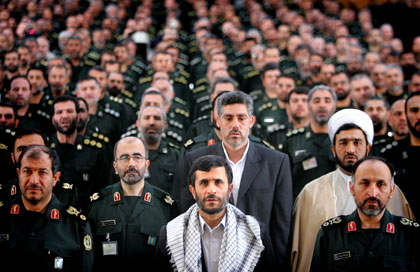|
UN steps would spark confrontation
(AP)
Updated: 2006-05-07 16:11
TEHRAN - Iran said on Sunday any U.N. action over its nuclear program would
be illegal and lead to confrontation.
Foreign Ministry spokesman Hamid Reza Asefi also declared yet again there was
nothing the international community could do to prompt Iran to suspend uranium
enrichment, declaring that "intervention by the Security Council in this issue
is completely illegal."

Iranian President
Mahmoud Ahmadinejad (front row C) sits with commanders from the Basij
Militia in Tehran May 7, 2006. Iran said on Sunday any measures taken
against its nuclear programme by the U.N. Security Council would push
Tehran towards confrontation with the West rather than cooperation with
the U.N. nuclear watchdog. Iran has been referred to the world body after
failing to convince the international community that its nuclear power
programme is not a smokescreen for building weapons.
[Reuters] |
Briefing reporters, also said
Iran's antagonists over its nuclear program were driven by "political
motivations."
"Countries sponsoring the draft resolution (Britain,
France and the United States) have political motivations," Asefi said. "It's
clear that any action by the U.N. Security Council will leave a negative impact
on our cooperation with the IAEA."
He was referring to the International
Atomic Energy Agency, the U.N. nuclear watchdog, which Iran has barred from
making snap inspections as the dispute over the program has escalated.
"Intervention by the U.N. Security Council would change the path of
cooperation to confrontation. We recommend they do not do this," Asefi said.
President Mahmoud Ahmadinejad, meanwhile, was quoted by state radio as
reissuing his charge the Iran's opponents were bullying the international
community and Iran.
"International organizations should not turn into
interpreters of few bullying powers... . If that's the case, then there was no
need for world nations to pay costs for keeping these organizations and few
interpreters would suffice to inform others of these bullying behavior. These
organizations must defend countries seeking peaceful nuclear technology and
disarm countries possessing weapons of mass destruction," he said.
The
U.S., Britain and France have expressed concern Iran is trying to build nuclear
weapons under cover of its enrichment program and are trying to craft a U.N.
resolution that would involve some measure of punishment should Iran fail to
cease processing uranium. Russia and China, the other two veto-holding council
members, have refused to agree to a draft resolution, calling for further
diplomacy.
Iran insists the program is designed only to make fuel for
reactors to generate electricity, and the IAEA says there is no evidence Iran
has a nuclear weapons program.
"The U.N. Security Council should not
take any action that it cannot later undo. We won't give up our rights and the
issue of suspension (of enrichment) is not on our agenda," Asefi said at his
weekly briefing.
At the U.N., Britain, France and the United States were
trying to bridge differences with Russia and China on resolution that could
eventually lead to sanctions against Tehran. The U.S. said it wants a vote in
the coming week, with or without support from Moscow and Beijing.
After
an informal two-hour meeting Saturday at Britain's U.N. Mission, council members
said they made some progress in a paragraph-by-paragraph discussion of the draft
resolution. But Britain's U.N. Ambassador Emyr Jones Parry said the most
contentious issues were not discussed in detail, which leaves a major question
mark over prospects for the resolution's speedy adoption.
"We are still
working to achieve unanimity ... but we're prepared to go to a vote without it,"
U.S. Ambassador John Bolton said. "We're not prepared to extend these
negotiations endlessly ... I think it's realistic to consider this for a vote
next week."
The resolution, co-sponsored by Britain and France and
backed by the U.S., would make mandatory the previous Security Council demands
that Iran suspend uranium enrichment, plutonium reprocessing, and construction
of a heavy-water nuclear reactor.
The draft states that the
"proliferation risk" posed by Iran constitutes a threat to international peace
and security, and the resolution would be adopted under Chapter 7 of the U.N.
Charter, which can be enforced by sanctions - or if necessary - military action.
Russia and China, both permanent council members with veto power, and
some nonpermanent members object to putting the resolution under Chapter 7. They
contend that there is no evidence that Iran is pursuing nuclear weapons - as the
U.S. and its allies believe - and they object to the call for possible "further
measures" to ensure Tehran's compliance.
Iran has said it wants the
issue turned back over to the IAEA for further negotiations. But the agency has
referred the Iranian program to the council, making it unlikely in the short
term that some sort of action in the Security Council will move forward.
Iran says it has the right to enrich uranium under the Nuclear
Nonproliferation Treaty, monitored by the IAEA. Iran's council opponents on the
issue say that right was given up when the IAEA determined in 2002 that Iran had
conducted secret nuclear research and development for decades.
|
| |
|
| |
|